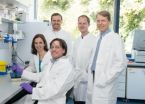(Press-News.org) A recent study by investigators at VIB and KU Leuven has demonstrated that chloroquine also normalizes the abnormal blood vessels in tumors. This blood vessel normalization results in an increased barrier function on the one hand -- thereby blocking cancer cell dissemination and metastasis -- and in enhanced tumor perfusion on the other hand, which increases the response of the tumor to chemotherapy.
The anti-cancer effect of the antimalarial agent chloroquine when combined with conventional chemotherapy has been well documented in experimental animal models. To date, it was assumed that chloroquine increases the sensitivity of cancer cells to chemotherapy by means of a direct effect on the cancer cells. However, a recent study by investigators at VIB and KU Leuven has demonstrated that chloroquine also normalizes the abnormal blood vessels in tumors. This blood vessel normalization results in an increased barrier function on the one hand – thereby blocking cancer cell dissemination and metastasis– and in enhanced tumor perfusion on the other hand, which increases the response of the tumor to chemotherapy.
Chloroquine is a well-known medicine with a good safety profile that has been in use since World War 2 for the treatment of malaria and certain auto-immune diseases, including rheumatoid arthritis. More recently, chloroquine has also been used in anti-cancer treatment. Chloroquine blocks autophagy, a process that cancer cells use to survive to anti-cancer treatments. Therefore, blocking autophagy would reduce the resistance of the cancer cells to chemotherapy.
Normalization of abnormal tumor blood vessels
Hannelore Maes from the team of Patrizia Agostinis (KU Leuven), together with Anna Kuchnio from the team of Peter Carmeliet (VIB-KU Leuven) have started a study to explain how chloroquine can strengthen the effect of anti-cancer treatments.
"Although it is assumed that chloroquine strengthens anti-cancer treatment by blocking autophagy, there is little in vivo evidence that this is the only way in which chloroquine works. In this study, we found that chloroquine not only has an effect on the growth of the cancer cells, but also makes the tumor environment less aggressive by normalizing the abnormal blood vessels in the tumor", says Patrizia Agostinis.
Peter Carmeliet: "Blood vessel normalization results in improved tumor perfusion. This reduces the aggressive nature of the cancer cells and means that the anti-cancer medicines are better able to reach the cancer cells, which makes chemotherapy more effective. In addition, tumor blood vessel normalization also increases the barrier function of the blood vessels, which reduces the access of cancer cells to the circulation – the most important transport system for the spreading of cancer cells to other tissues. Therefore, chloroquine can nip the metastatic spreading of cancer cells in the bud, which is the most important therapeutic goal in any tumor treatment."
Disadvantages do not outweigh the benefits – the impact of this study on the use of chloroquine in anti-cancer treatment
This study forms a new rationale for the use of chloroquine in anti-cancer treatment. With a view to clinical studies (tests on humans) it is important to note that the effects on the tumor vasculature were even observed at chloroquine concentrations that had little effect on autophagy in the cancer cells. This sheds new light on the therapeutic schedule for combination therapy with chloroquine, which could result in decreased toxicity. In other words, the same "old" medicine simultaneously targets the cancer cells themselves and the blood vessels with great efficiency.
INFORMATION:
Research teams
This research was conducted by the team of Patrizia Agostinis, Department of Cellular and Molecular Medicine, KU Leuven in collaboration with the team of Peter Carmeliet from the VIB Vesalius Research Center, KU Leuven.
Malaria medicine chloroquine inhibits tumor growth and metastases
2014-08-11
ELSE PRESS RELEASES FROM THIS DATE:
Climate change negatively impacting Great Lakes, GVSU researcher says
2014-08-11
MUSKEGON, Mich. -- Climate change is having a direct negative effect on the Great Lakes, including impacts to recreational value, drinking water potential, and becoming more suited to invasive species and infectious pathogens, according to a Grand Valley State University researcher.
The impact of climate change on the Great Lakes, as well as other natural resources in the United States, was explored in the report "Science, Education, and Outreach Roadmap for Natural Resources," recently released by the Association of Public and Land-grant Universities. Kevin Strychar, ...
CRI scientists pinpoint gene likely to promote childhood cancers
2014-08-11
DALLAS – Aug. 11, 2014 – Researchers at the Children’s Medical Center Research Institute at UT Southwestern (CRI) have identified a gene that contributes to the development of several childhood cancers, in a study conducted with mice designed to model the cancers. If the findings prove to be applicable to humans, the research could lead to new strategies for targeting certain childhood cancers at a molecular level. The study was published today in the journal Cancer Cell.
“We and others have found that Lin28b – a gene that is normally turned on in fetal but not adult ...
US immigration is associated with rise in smoking among Latinos and Asians
2014-08-11
Immigration to the U.S. may result in increased smoking in Latino and Asian women, according to new research from sociologists at Rice University, Duke University and the University of Southern California.
The study, "Gender, Acculturation and Smoking Behavior Among U.S. Asian and Latino Immigrants," examines smoking prevalence and frequency among Asian and Latino U.S. immigrants. The research focuses on how gender differences in smoking behavior are shaped by aspects of acculturation and the original decision to migrate. The study was published recently in the journal ...
Kessler Foundation researchers publish study on task constraint and task switching
2014-08-11
West Orange, NJ. August 11, 2014 -- Kessler Foundation scientists have published results of cognitive research that show the negative effects that unexpected task constraint, following self-generated task choice, has on task-switching performance. The article, "You can't always get what you want: The influence of unexpected task constraint on voluntary task switching", was published online on June 11 by The Quarterly Journal of Experimental Psychology (DOI:10.1080/17470218.2014.917115). The authors are Starla Weaver, PhD, and Glenn Wylie, DPhil, of Kessler Foundation, John ...
Study: 1 out of 5 adult orthopaedic trauma patients sought additional providers for narcotic prescriptions
2014-08-11
ROSEMONT, Ill.─"Doctor shopping," the growing practice of obtaining narcotic prescriptions from multiple providers, has led to measurable increases in drug use among postoperative trauma patients. The study, "Narcotic Use and Postoperative Doctor Shopping in the Orthopaedic Trauma Population," appearing in the August issue of the Journal of Bone & Joint Surgery (JBJS), links doctor shopping to higher narcotic use among orthopaedic patients. The data was presented earlier this year at the 2014 Annual Meeting of the American Academy of Orthopaedic Surgeons (AAOS).
"There ...
Keeping viruses at bay
2014-08-11
>
Our immunosensory system detects virus such as influenza via specific characteristics of viral ribonucleic acid. Previously, it was unclear how the immune system prevents viruses from simply donning molecular camouflage in order to escape detection. An international team of researchers from the University of Bonn Hospital and the London Research Institute have now discovered that our immunosensory system attacks viruses on a molecular level. In this way, a healthy organism can keep rotaviruses, a common cause of diarrheal epidemics, at bay. The results have been published ...
Fertile discovery
2014-08-11
Queen's University researcher Richard Oko and his co-investigators have come up with a promising method of treating male infertility using a synthetic version of the sperm-originated protein known as PAWP.
They found this protein is sufficient and required to initiate the fertilization process.
Dr. Oko's research promises to diagnose and treat cases of male factor infertility where a patient's sperm is unable to initiate or induce activation of the egg to form an early embryo.
"PAWP is able to induce embryo development in human eggs in a fashion similar to the natural ...
Penn-led expert panel calls for public health research on natural gas drilling
2014-08-11
PHILADELPHIA – Groundwater and air quality testing before, during, and after natural gas drilling – which includes hydraulic fracturing -- should be key components of efforts to ensure the safety of communities near these sites, according to an expert panel convened to weigh in on public health research needs associated with unconventional natural gas drilling operations (UNGDO). The panel also urges that any research conducted should use "community-based participatory research principles" so that the concerns of the many stakeholders involved in these activities can be ...
Rutgers researchers show that how fast you drive might reveal exactly where you are going
2014-08-11
In our constantly connected, information-rich society, some drivers are jumping at the chance to let auto insurance companies monitor their driving habits in return for a handsome discount on their premiums.
What these drivers may not know is that they could be revealing where they are driving, a privacy boundary that many would not consent to cross.
A team of Rutgers University computer engineers has shown that even without a GPS device or other location-sensing technology, a driver could reveal where he or she traveled with no more information than a starting location ...
School violence, gun-related injury among top 10 child health concerns nationally
2014-08-11
ANN ARBOR, Mich. – Childhood obesity remains the top health concern for children in 2014, but when asked about national concerns, adults put school violence and gun-related injuries in the top 10, according to a new University of Michigan C.S. Mott Children's Hospital National Poll on Children's Health.
In the poll's annual top 10 list, a nationwide sample of adults were asked to identify the biggest health concerns for kids in their communities, as well as kids nationwide. Overall, childhood obesity is rated at the top of both lists: 29 percent of adults said obesity ...




